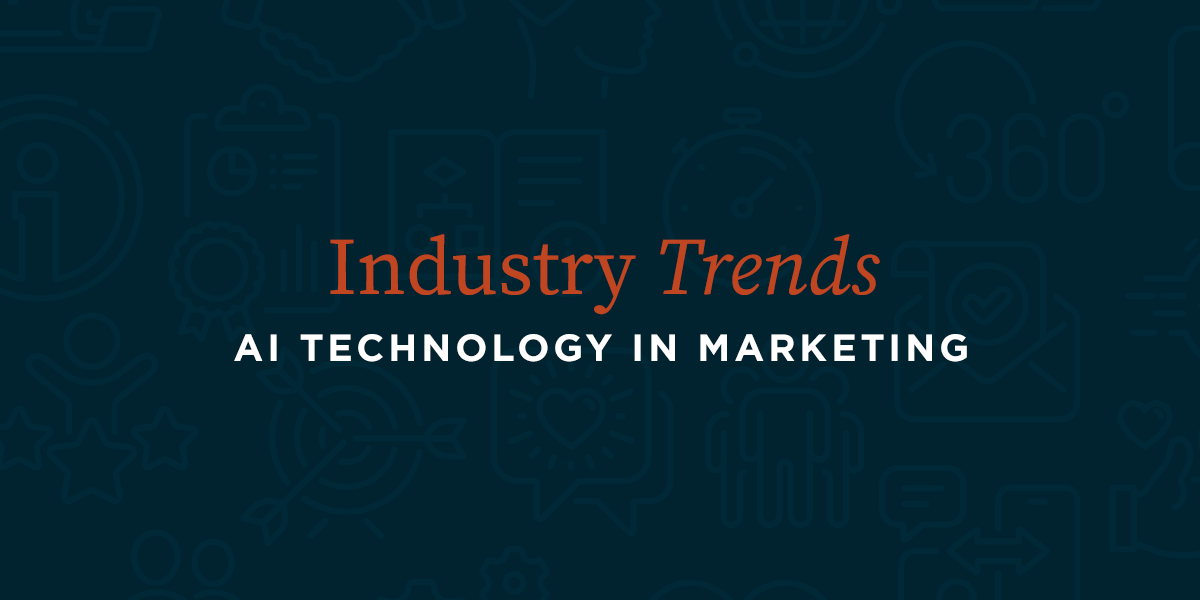Industry Trends: AI Technology in Marketing

AI has significantly impacted marketing, transforming the way content and design are created and the customer experience brands can offer.
The Latest Leap in Intelligent Technology
If you’ve been following along lately, you’ve probably seen the hype over the latest iteration of ChatGPT and the advancement of artificial intelligence (AI) software. We’ve been leaning on AI for a while now in marketing – from email personalization and automation to strategic digital ad placement for target audiences – so it isn’t new, per se. These algorithms get better and better as they are exposed to more data points and increase the likelihood of reaching our ideal customers. BUT this latest leap in intelligent technology goes beyond targeting; it generates smart, conversational content and design options all at the push of a button, saving enormous amounts of time!
According to a piece written by Forbes, “a McKinsey study found that, along with sales, [marketing] is the single business function where [AI] will have the most financial impact. This means that if you’re a marketer and you’re not using AI, you’re missing out on the benefits of what is possibly the most transformational technology.”
Let’s dig into the latest AI tools available for content and design creation, the impact this new technology is already having on the marketing industry, and best practices for adding AI to your toolbox.
AI in Content Generation
AI is transforming the way we create content, allowing for quicker and more efficient production. With the help of AI, you can generate copy in a moment from simple prompts, helping with brainstorming ideas, completing repetitive writing tasks, and optimizing for SEO. Tools such as ChatGPT, CopyAi, Surfer, GrowthBar, Writer.ai, and other platforms are dominating the market currently, but stay tuned for a new content creation tool we’re excited about coming soon from HubSpot: ChatSpot!
While the latest tools tout the ability to spit blogs out 10x faster than a human being, from our experience, you still need to send every piece through a thorough editing process for fact checking and readability – at least for now. In its current form, AI content tools may be better used for the most difficult aspect of writing: finding inspiration. Getting started is often the biggest challenge, so leaning on artificial intelligence to get the creative juices flowing is an idea gold mine and such a time saver!
AI in Design Creation
AI has also revolutionized graphic design by delivering designs, logos, banners, color schemes, and presentation templates quickly. This creates a jumping-off point for any designer, allowing for more experimentation and the ability to produce revisions faster than ever before. AI-powered design creation tools such as MidJourney, MissJourney, Jasper, Runway, Shutterstock, and Adobe Firefly (coming soon) are transforming the design creation process. And just like with content, these design concept generators help creatives overcome the most difficult part of the creative process: finding inspiration.
How AI is Impacting Marketing
When we think about artificial intelligence technologies, we naturally tend to think of robotic or sterile experiences. But ironically, AI-supported marketing campaigns provide prospects with more personalized messaging and guide customers in a customized way – it actually feels more human.
As a consumer, you’re interacting with AI every day. And if your business has ads in the digital space, you’ve probably been leaning on AI for a while now. With AI-powered tools, marketers can automate various tasks, including ad targeting, email personalization, and customer segmentation. AI is also helping marketers analyze data and make predictions about consumer behavior. Successful AI-powered marketing campaigns include those by Coca-Cola, Sephora, and McDonald's. In fact, Sephora started getting attention for their AI-backed marketing approach back in 2018!
So, how is AI impacting marketing? It’s guiding us to make smarter decisions backed by data. It’s bringing relational interactions back to business. And now it’s helping us create content faster than ever before.
Best Practices for Using AI in Marketing
While the efficiency and creativity to be gained from AI is alluring, there are ethical considerations we all must keep in mind. AI should not replace human decision-making entirely, and marketers should understand how AI tools are making decisions. In this new age with the power of machine learning and AI at our fingertips, we must exercise moral restraint and recognize where to set ethical boundaries.
A primary concern is in the innate bias that may develop over time when a machine is fed basic demographic information and continues to build algorithms based on it without oversight. This could perpetuate the social issues we’ve collectively been working so hard to correct. Not to mention it could also have legal ramifications.
Consumers expect transparency from their favorite brands, and businesses sink or swim based on the trust they build with their loyal base. And with the departure of -party cookies, AI has given marketers the ability to continue to provide a tailored customer experience. But in a world where consumers are voicing privacy concerns and regulators are backing them, companies must make wise and calculated decisions with emerging technologies.
The Future of Marketing with the Advancement of AI
AI has significantly impacted marketing, transforming the way we create content and design and the overall customer experience brands can offer. With the help of AI-powered tools, marketers can automate various tasks, allowing for quicker and more efficient production, and use them as a springboard for creative inspiration.
While AI is an invaluable asset, marketers must consider ethical practices and ensure that human decision-making and oversight is not entirely replaced. With safeguards in place, we’re excited to see what the future of AI holds and the productivity we’re capable of with these powerful new marketing tools!
Remember: AI is a productivity tool. Be curious and infuse AI into what you're already doing to complement your work and make it more efficient, not replace it.
Curious how to implement AI to make your marketing strategy more effective? 

